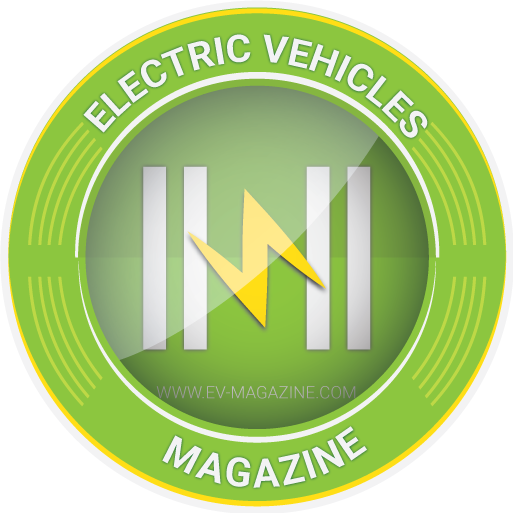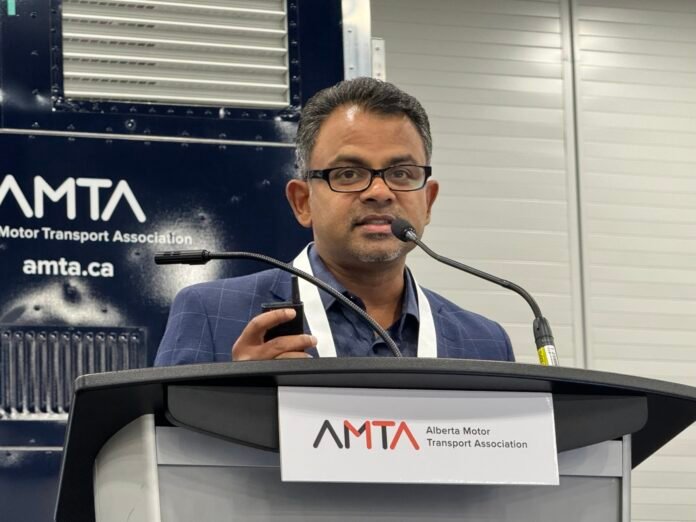A new Deloitte report says hydrogen vehicles may offer the best path to decarbonize longhaul heavy-duty trucking in Western Canada, but challenges like high vehicle and fuel costs, limited infrastructure, and mismatched expectations between OEMs, infrastructure providers, and fleets are slowing adoption.
Hydrogen-powered vehicles — particularly fuel-cell-electric vehicles (FCEVs) — offer fueling times and range that are similar to internal combustion engines, making them more suitable than battery-electric vehicles (BEVs) for longhaul trucking, said Arvind Ramakrishnan, Deloitte’s director of sustainability and climate change, presenting findings to the Alberta Motor Transport Association’s Industry Innovations Expo.
Deloitte’s Arvind Ramakrishnan at AMTA 2024 Expo. (Photo: Krystyna Shchedrina)
For regional delivery trucks operating around 100 kilometers per day and carrying up to 80,000 lb., Deloitte’s total cost of ownership (TCO) analysis shows BEVs are comparable to other fuel types, including hydrogen FCEVs. However, for longhaul trucks traveling more than 450,000 kilometers per year, BEVs are less viable.
“For those kinds of operations, battery-electric trucks, as we all know, are not even suited to fit the duty cycle of those trucks just because of the range, the fueling times required, the weights that they need to carry, [and] the hills that they need to move on,” Ramakrishnan said.
Total cost of ownership: a critical factor
The TCO is a key consideration for fleet operators making vehicle purchasing decisions, according to Deloitte. Factors such as fuel prices, maintenance costs, and vehicle lifespan all play significant roles. For hydrogen to compete with other fuel types, reducing its cost is essential.
“The cost of hydrogen model here is north of $25 to $30 a kilogram, right here in Alberta,” Ramakrishnan said. “And what we figured out [is] that for us to reach comparable levels to battery electric, it needs to come down to the $4-$5 a kilogram.”
Edmonton key hub for hydrogen adoption
Beyond cost, geographic location plays a crucial role in hydrogen adoption. Deloitte says the Edmonton region is the most strategic location in Western Canada for hydrogen vehicle deployment due to its position along key trucking corridors and existing hydrogen infrastructure. Developing refueling stations along these routes will be essential to support longhaul trucking, especially between Edmonton and Calgary, one of Alberta’s busiest corridors.
(Image: Deloitte)
(Image: Deloitte)
The Edmonton-to-Calgary route along Highway 2, spanning 300 kilometers, is highlighted as the highest-impact corridor. The report notes that the Edmonton Region already has one permanent hydrogen fueling station and several temporary ones. In April 2024, Air Products announced plans to open a multi-modal hydrogen fueling station at its Edmonton facility, with the goal of creating a “hydrogen highway” between Edmonton and Calgary by 2025.
Other key corridors identified in the report include Edmonton-to-Prince George, B.C., via Highway 16, and Edmonton-to-Fort McMurray, Alta. The report suggests building a hydrogen fueling station in Hinton, Alta., to connect Edmonton and Prince George, while high trucking volumes along the Edmonton-to-Fort McMurray route make it a prime candidate for refueling infrastructure.
(Image: Deloitte)
The report also identifies Vancouver and Prince George in B.C. as strategic regions for developing hydrogen infrastructure. Both cities have announced plans to produce approximately 400 tonnes of hydrogen per day, which will spur further investment in fueling stations.
HTEC plans to open a heavy-duty hydrogen fueling station on Tsawwassen First Nation land near Vancouver, while also developing a clean hydrogen facility that could support up to 30,000 fuel cell vehicles, according to a related news release.
Meanwhile, Hydra Energy is set to open Prince George’s first commercial fueling station with on-site hydrogen production and plans to establish a low-carbon hydrogen production facility in 2024.
Challenges to adoption
While FCEVs hold significant promise for longhaul trucking, Ramakrishnan said there are several key challenges that stand in the way of faster adoption.
One major hurdle is the high capital cost of FCEV trucks themselves. “It’s north of about $900,000, even a million dollars for a brand new fuel-cell-electric truck — that is four times higher than [a] diesel truck.”
Another issue is the lack of hydrogen fueling infrastructure and high cost of hydrogen itself, which further creates competition for vehicle availability.
“We are competing for these models in Europe and California, and OEMs are strongly prioritizing those markets where there is heavy incentives and infrastructure availability,” said Ramakrishnan, adding that collective action is needed to address these challenges. He also says there is a big mismatch of expectations between OEMs, infrastructure providers, and fleet operators.
“It goes back to the ‘chicken and egg’ issue, and that’s really interesting, because each needs the other,” Ramakrishnan said. “I mean, the OEM says, ‘I can’t move until I get an order of 50,’ and infrastructure service providers are saying, ‘We can’t get to the $5 a kilogram until we see demand.’”
Source link
#Hydrogen #key #decarbonizing #longhaul #trucking #Deloitte







